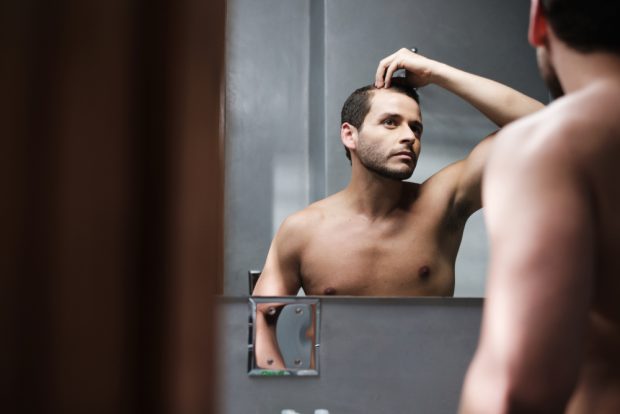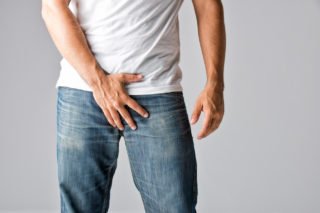Male balding can lead to a great deal of embarrassment and pain for many people, making it easy for companies promoting ‘miracle’ hair-growth serums to prey on those feeling vulnerable. Medical specialist Dr.Earim Chaudry of Manual shares his thoughts on the matter.
Unfortunately, there is very little that can be done to make your hair grow back thick and long once it has started to recede, but there are definitely precautions that can be taken as preventative measures.
Male balding truths
Despite there being steps you can take to avoid hair loss, male-pattern baldness is usually genetic or due to hormones. Studies have shown that male baldness is caused by a hormone called Dihydrotestosterone (DHT), a male sex hormone that essentially causes male characteristics. They are rich in androgenic properties – and as androgens are responsible for hair growth, normal levels of them are crucial. Women also produce some androgen in their body.
When too much DHT is present, the growth cycle begins to slow down, meaning the hair follicles start to shrink. The end result of the process is that no new hair follicles grow at all – which has led to all kinds of formulas being created to supposedly reverse hair loss.
Experts at Manual have trawled the internet to find the most common myths surrounding male balding, to debunk them, and offer treatments and methods that have been genuinely proven to work. Keep reading to find out more.

engagestock/shutterstock
Debunking 7 Myths Behind Male Balding
1. Your Mum is to Blame for Your Genetic Hair Loss
Due to baldness typically being caused by the X chromosome, which is the female chromosome inherited from mothers, this process has long been solely blamed on the mums of the world.
While there is a certain amount of truth behind this, the genetic trait can be passed down from either side of the family, and can even skip generations – meaning there could be no family pattern to refer to at all.
A scale called the Norwood Scale is used to determine levels of male pattern baldness, which has seven different levels of severity. For example, if your hair begins to recede to a Level 2 and your father still has lustrous locks, it doesn’t necessarily mean the gene has come from your mother, as a generation could have been skipped.
2. Male balding is Caused by Stress
There is some slight truth to this as, while something terrible happening, such as a bereavement or a job loss, can cause you to lose your hair temporarily, it can be reversible.
When it comes to genetic or hormonal male pattern baldness, which can be permanent, stress does not play a part.
Studies have shown that intense stress hormones can lead to a pause in the hair growth cycle, which can lead to hair shedding for a certain amount of time. However, stress cannot cause your hair to fall out immediately (as it does in films) or forever.
 3. Sun Exposure Can Cause Baldness
3. Sun Exposure Can Cause Baldness
While too much exposure to the sun can be very damaging in other ways, it does very little to cause hair loss. It is true that spending prolonged periods of time on a sunbed can make your hair lighter, drier, or even cause it to break off slightly.
However, male pattern baldness is not affected by the sun. If you are somebody that likes to travel abroad a lot or works outdoors, it could be wise to invest in a deep conditioning mask to keep your hair glossy and moisturized.
4. Wearing Hats too Will Often Make Your Hair Thinner
Another widespread myth is that wearing a hat – especially tight ones – too will often cause male pattern baldness. Once again, there is a certain element of truth behind this rumor.
Many things can cause your hair to be pulled out, from having it tied up too tight, to bleaching it too regularly, to using heated tools on it too often – but this is not the same thing as genetic hair thinning.
Hair being pulled out by something causing too much pressure to the hair follicles is known as ‘traction alopecia’, and it can be reversed by having a healthier hair routine and avoiding chemicals and aggressors that add stress to your strands.
5. Washing Your Hair too Regularly Causes Hair Loss
All of us will have noticed a build-up of hair in the plughole of the shower after a while, or even scattered across the floor as we dry or style our tresses. Because massaging shampoo or serum into the hair causes several strands to shed, it is no surprise that many people are convinced that regular washes can cause permanent hair loss.
Hair shedding during washing and drying is totally normal, and would only cause genuine damage if your locks were already damaged by chemicals or something else adding pressure to your follicles. So, next time you are shampooing, try not to panic – most of us experience a hair fall while washing.
6. Too Much Testosterone Leads to Balding
Testosterone itself is not linked to male pattern baldness. However, DHT (discussed previously) is a byproduct of testosterone and is created by an enzyme called 5α-reductase.
If your levels of 5α-reductase are unusually high anyway, then increasing testosterone levels (with injections) would cause more extreme levels of DHT and, in turn, your hair would recede more rapidly. So, long story short, testosterone itself does not cause hair loss.
 7. Masturbation Causes Hair Loss
7. Masturbation Causes Hair Loss
Once again, have no fear – there is absolutely no truth behind this myth. If you have never heard of the link between masturbation and male balding, the rumor arose due to many people worrying about the loss of protein as you ejaculate, which would eventually lead to a loss of hair.
People also worry that masturbating causes higher levels of testosterone and, in turn, encourages pale pattern baldness. However, as mentioned above, testosterone itself will not directly promote hair loss.
Are There Treatments Out There that Actually Work?
Finasteride
Unfortunately, no treatment is said to be 100% effective and can work differently depending on the severity of hair loss and thickness. However, the NHS recommends that a drug called Finasteride can be used to treat male hair loss, as it works to block the production of 5α-reductase (mentioned previously).
It is said to have side effects such as chills, night sweats, and mild confusion, so you should always consult a doctor before trying it out.
Minoxidil
Another drug commonly prescribed for male hair loss is that of Minoxidil. It works differently from Finasteride and helps to encourage blood flow to your hair follicles, which works to promote a stronger growth cycle. Once again, this must be used with caution, as rare side effects can include hair loss or inflamed skin.
While male balding can understandably cause distress and anxiety for people suffering from it, it is nothing to be ashamed of.
Many people find their hair thinning from a very early age and, if so, it may simply be worth embracing – if people like Jason Statham, Vin Diesel, and Dwayne ‘The Rock’ Johnson can pull it off, why can’t you?
References
Medical News Today: The Norwood Scale and Male Pattern Baldness:. https://www.medicalnewstoday.com/articles/327001
Manual Health Center: https://www.manual.co/health-
Read more stories on LongevityLive.com about non-invasive ways to address male baldness by medial specialist Dr Reza Mia. Click here



 3. Sun Exposure Can Cause Baldness
3. Sun Exposure Can Cause Baldness 7. Masturbation Causes Hair Loss
7. Masturbation Causes Hair Loss![women [longevity live]](https://longevitylive.com/wp-content/uploads/2020/01/photo-of-women-walking-down-the-street-1116984-100x100.jpg)










